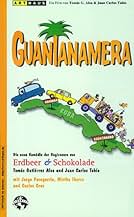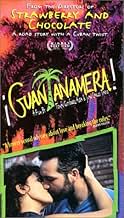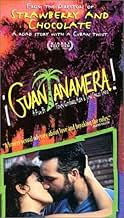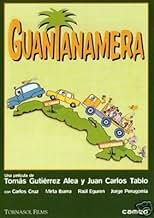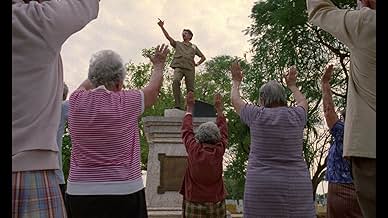IMDb RATING
6.9/10
1.6K
YOUR RATING
During a funeral procession in Cuba, mourners and truck drivers engage in deep conversations, revealing unexpected connections between their contrasting lives.During a funeral procession in Cuba, mourners and truck drivers engage in deep conversations, revealing unexpected connections between their contrasting lives.During a funeral procession in Cuba, mourners and truck drivers engage in deep conversations, revealing unexpected connections between their contrasting lives.
- Directors
- Writers
- Stars
- Awards
- 7 wins & 1 nomination total
Mirtha Ibarra
- Georgina
- (as Mirta Ibarra)
Luisa Pérez-Nieto
- Marilis
- (as Louisa Pérez Nieto)
José Ángel Espinosa 'Ferrusquilla'
- Justo
- (as Jose Antonio Espinosa)
Rubén Breña
- Rivero
- (as Rubén Breñas)
- Directors
- Writers
- All cast & crew
- Production, box office & more at IMDbPro
6.91.6K
1
2
3
4
5
6
7
8
9
10
Featured reviews
Guantanamera-A love and death epic story
Hearing the word Guantanamera, a word surge raced through my mind; Cuba, Guantanamo prison, Guatemala, or one of the most common Latin American songs? What could it be? I wondered. It is not much of the above but a sound track to a road movie Guantanamera, a death and love story.
In matters pertaining to birth, death and burial, people may not choose the place of birth or death, but they chose where they want to be buried. And this becomes a central issue in this road movie. It portrays the core values of a typical traditionalist Cuban family in a socialist country. It is for this reason that a dead body gets flown either out of state or country for burial. A song (Guantanamera), well spiced and crafted to fit each and every moment and character plays throughout the movie. This movie exposes the economics of a socialist run country. Road side vendors price their items in dollars. This suggests the instability of the national currency (possibly inflation).
When Gina puts on a new dress and let her hair run loose, it symbolizes self discovery and a sense of freedom. For the first time in this movie, she stands up to her husband and tells him that the days of subordination are over, she would not take off her dress. But also this could or symbolize people who live under a communist run regime, that there is limited freedom of choices. Those who are fed up of the system migrate, or export themselves to America through illegal means.
The directors did a great job in telling the general public about the flaws of a communist run country; corruption, dilapidating buildings and failed economy. Also the directors employed an excellent editing technique MONTAGE. Gina paces up and down and finally walks away from the funeral and finds comfort and love in Mariano. Both Gina and Mariano ecstatically share a smile and laughter whilst the funeral is still in procession. The MONTAGE suggests the anguish of people in Cuba go through in deserting their beloved country in search of freedom and better life.
In matters pertaining to birth, death and burial, people may not choose the place of birth or death, but they chose where they want to be buried. And this becomes a central issue in this road movie. It portrays the core values of a typical traditionalist Cuban family in a socialist country. It is for this reason that a dead body gets flown either out of state or country for burial. A song (Guantanamera), well spiced and crafted to fit each and every moment and character plays throughout the movie. This movie exposes the economics of a socialist run country. Road side vendors price their items in dollars. This suggests the instability of the national currency (possibly inflation).
When Gina puts on a new dress and let her hair run loose, it symbolizes self discovery and a sense of freedom. For the first time in this movie, she stands up to her husband and tells him that the days of subordination are over, she would not take off her dress. But also this could or symbolize people who live under a communist run regime, that there is limited freedom of choices. Those who are fed up of the system migrate, or export themselves to America through illegal means.
The directors did a great job in telling the general public about the flaws of a communist run country; corruption, dilapidating buildings and failed economy. Also the directors employed an excellent editing technique MONTAGE. Gina paces up and down and finally walks away from the funeral and finds comfort and love in Mariano. Both Gina and Mariano ecstatically share a smile and laughter whilst the funeral is still in procession. The MONTAGE suggests the anguish of people in Cuba go through in deserting their beloved country in search of freedom and better life.
Love story or self discovery.
Guantanamera is a movie that encompasses the genre of a road movie and love story. Gina's Aunt Yoyita from Havana, who was once a famous performer, is in Guantanamera to receive an award. During the award ceremony, she notices her long lost love from 50 years ago, Candido. The relationship rekindles and the two are in love once again. When Yoyita suddenly dies, her body needs to be transported back to Havana. Gina's husband Adolfo, who is an undertaker for the state, takes charge of everything and arranges Yoyita's long complicated journey home. Adolfo is an arrogant abuser who has no respect for his wife. At one point he visualizes himself on top of a statue, as the leader. Accompanied by a driver, Adolfo, Gina, and Candido make the long complicated journey to Havana transporting Yoyita from vehicle to vehicle implementing Adolfo's new money saving plan. During the journey, Gina encounters one of her prior students, a womanizing trucker named Mariano, who has longed for Gina since she was his teacher. The two find themselves running into each other at different points along the way. Is Adolfo worthy of Gina's love, or does Mariano finally win his long lost teacher? The director makes it a point for the camera to show us the lush tropical background of Cuba, as well as the poor, dirty, poverty stricken areas displaying billboards with political messages indicating corruption. During the journey, Mariano and Ramon are seen picking up hitchhikers delivering them, as well as, the product on the bed of the truck. The roads are unpaved and dirty showing the economic hardship of the region. Favors are done in exchange for monetary reward, evidence of economic corruption. The film techniques used are similar to those used in Hollywood. They include the use of brightly lit scenes, with most being filmed outside, using natural daylight. The cinematography was mostly at eye level with a motion picture camera,showing steady, smooth scenes. The film was slow paced but kept my attention.
An Attitude
Guantanamera is a very laughable movie.The events sometimes seem absurd, however they are real.Guantanamera portrays situations that are common in daily Cuban life.The Director went beyond official parameters and adopted a critical attitude before the difficulties faced by people in actual Cuba.It is like Gutierrez Alea tells us: "let's laugh of our disgrace." Gutierrez Alea earned two things with this movie: the laugh of the audience, and the ire the President of his country in one of his speeches
Reporting on Cuba: Subtle metaphors, and "slices of life"
As pure entertainment, the film does seem scattered and unfocused. However, it packs in many social, political and cultural messages on different levels. For instance, as the characters enter Bayamo, we hear a tour guide telling of Bayamo as historical center for smuggling and how this motivated rebellious action against colonial Spain. I took this as a commentary about present-day Cuba. The film is filled with metaphors, starting, of course, with the plot: a former economics teacher falls in love with a trucker and leaves her crass, heartless, bureaucrat husband. To really enjoy this movie, you have to understand that it is a report on the state of the country, and the characters and plot serve to veil documentary as movie fiction. Knowledge about recent Cuban history certainly helps understanding the movie, though, and you may want to see other films or read about present-day Cuba first.
Only all too high-spirited road movie
When his wife's aunt dies, mortician Adolfo uses the opportunity to show his political talent by trying out a new, very communist` way of transporting the body. On the way, lots of different things happen to him, the dead body, his wife and the aunt's mourning admirer, and Adolfo is close to getting mad because he fears he won't be able to realize his time schedule. His character is good for a smile.
The Cuban film Guantanamera` wants to be everything: comedy, romance and a satire on the communist system in Cuba. It's half-baked but ... nice. And I was surprised about the actors: they did a good job and obviously they enjoyed it.
The Cuban film Guantanamera` wants to be everything: comedy, romance and a satire on the communist system in Cuba. It's half-baked but ... nice. And I was surprised about the actors: they did a good job and obviously they enjoyed it.
Did you know
- TriviaFinal film directed by Tomás Gutiérrez Alea.
- ConnectionsReferenced in Last Night (1998)
- How long is Guantanamera?Powered by Alexa
Details
Box office
- Gross US & Canada
- $903,840
- Opening weekend US & Canada
- $8,851
- Jul 6, 1997
- Gross worldwide
- $903,840
Contribute to this page
Suggest an edit or add missing content

